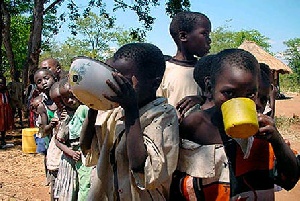Over 10,000 Ghanaian children die each year from diarrhoea and pneumonia diseases, linked to the limited access to safe water, sanitation and hygiene in 2015, the United Nations Children’s Fund (UNICEF) has stated.
According to UN agency, hygienic practice like handwashing with soap alone could reduce diarrhoea by up to 50 percent and pneumonia by 25 percent, yet only 20 percent of Ghanaians wash their hands.
It indicates that the awareness about the importance of the practice remains low in the country, with a handwashing rate growth of only eight percent over the last three years.
“Thousands of lives could be saved if washing hands becomes a habit for everyone,” David Duncan, WASH Chief, UNICEF, said.
Interacting with journalists at UNICEF office ahead of the Global Handwashing Day celebrated every year on October 15, Mr Duncan stated that the simple act of handwashing with soap could save over 300,000 children under five who die from diarrhoeal disease globally.
He said although the figures are staggering, they could be greatly reduced by working with children and families to adopt a very straightforward solution like handwashing.
“We know, for example, that handwashing with soap before meals and after using the toilet could reduce the incidence of diarrhoea infections by 50 percent.”
Proper handwashing practice also contributes to the healthy development of children by keeping them in school. Handwashing actually improves school attendance by reducing the spread of preventable diseases, which means children are not staying home because of illness,” he said.
Global Handwashing Day is an annual global advocacy day dedicated to increasing awareness and understanding about the importance of handwashing with soap as an easy, effective, and affordable way to prevent diseases and save lives.
Health News of Wednesday, 19 October 2016
Source: dailyguideafrica.com













